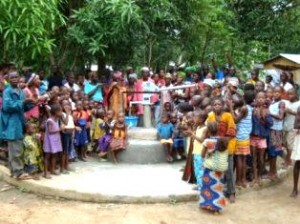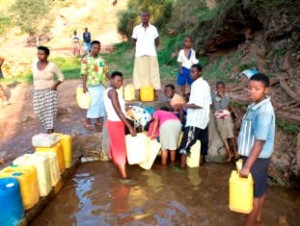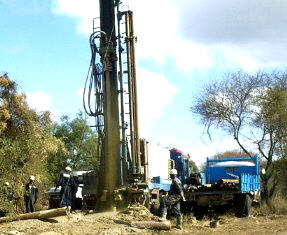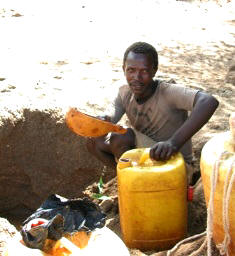By Jerry Wiles
Some time back, I visited a region in East Africa where the people had experienced a severe drought for several years; most of the water wells in that region were dry. Living Water International had drilled a deep well there about eight years earlier, and it was one of the few productive water wells in the entire region.

I was told that 30,000 people were getting water from that one well, and in addition to the people, the livestock and wild animals also got water there. The local people called it “The Miracle Well.” A missionary who was serving in that area told us that if it were not for that one well, there would probably be 30,000 dead people in the region.
The water committee for the well was made up primarily of Masai pastors, who managed it and took turns going to get fuel for the generator. They had worked out a system so the people could come to the well every other day. Many would walk several hours to get water. We were told that 80% of the people in the region had come to Christ since the well was put in. Being there with those dear people caused me to think in a new way about one of LWI’s tag lines, “Saving Lives and Changing Destinies.” That experience was a great demonstration and reinforcement of the transforming power of water and the Word.
At a reception of government, business and ministry leaders in Africa, I was approached by a young man who said to me, “I am alive today because of you.” When I asked what he meant, he told me a story of how Living Water International had drilled a well in his village when he was a little boy. He shared how the well had transformed the entire community. Access to clean water was used to improve the health, the educational opportunities, the economic development and the spiritual and social life in the community.

When we hear people’s stories of the problems, difficulties, pressures and crises in life, one of the stories we use in our Orality Training Workshops takes on great meaning. Learning the story of “Jesus Calming the Storm,” from Mark chapter 4, helps people relate to the storms of life, which we all experience in one form or another. Storms of life might be financial crisis, living in a war-torn country, experiencing genocide, extreme poverty, persecution or some other difficulty.
Not only is this story a great teaching tool, it’s a great story to introduce the Good News of Jesus. We ask people, “How would you like to hear a story that will help you know how to deal with the problems, pressures and difficulties in life?” That question, followed by telling the story and some post-story discussion, can lead to sharing the gospel in a very relevant and effective way.
A man who attended one of Living Water International’s Orality Training Workshops, and learned this story, told about his experience traveling to an East Asian country and how he used it in sharing Christ. Since that experience, he has continued to use the story of “Jesus Calming the Storm” to introduce the gospel and share Christ in various settings.
In addition to using this story to introduce the gospel and share our faith, the story can be effective in sharing many lessons and biblical principles.
After telling the story, the following are a few questions that help to bring out some important lessons in it:
* What do we learn about Jesus from this story? His humanity? His deity? We can point out that if someone had been teaching a large crowd of people all day, he would probably be tired and sleepy as well. So the fact that Jesus was sleeping in the back of the boat tells us something about His humanity. His ability to calm the storm shows us He has power over nature, and we learn about His deity.
* What do we learn about prayer? Who do we go to during the storms of life? The problems, pressures and difficulties of life? We note that the disciples went to Jesus and called upon Him. Groups discussing this story usually talk about how we should go to Jesus first when we face storms (difficulties, problems or crisis situations) in life.
* What do we learn about fear? Is fear a common experience today?
* What did Jesus mean when He asked His disciple, “Why are you so afraid?” “Where is your faith?” These questions can open a rich conversation about how perfect love casts out fear and that greater is He who is in us than he who is in the world.
* What do we learn from the fact that Jesus rebuked the wind and spoke to the waves? He said, “Quiet, be still,” and there was a perfect calm. These questions set the stage to discuss the power of the Word of God. When the conversation gets to the application questions, we learn that our words, directed by the Holy Spirit, have power to bring about change and transformation.
* Do His words still have power to change things and people today? Do our words have power?
* Can Jesus still bring calmness to our lives today? This is a great question to illustrate God’s willingness to intervene, answer prayer and give us calmness in the midst of trouble, turmoil and difficult situations.
We all face storms in our lives: problems, pressures, difficulties or crisis situations. People who participate in LWI’s Orality Training Workshops in Africa or Asia often identify with different applications of the storms than people in the Americas.
There are many other questions we can ask about this story. Telling the story and asking a few questions provides the opportunity to bring out many truths and lessons from the story.

The man who told this story in East Asia was amazed at how it captured the attention of the people there. A lady who heard the story began to ask questions. She asked how she could get to know Jesus and have a relationship with Him. When our speech is with grace, seasoned with salt, it will create a thirst for people to want to know more.
God’s Word has always had power to change things and change people. This is a great lesson we can build upon from the story of “Jesus Calming the Storm.” Furthermore, when we consider the application of that principle, we can have confidence that the words we speak can have power to change things and change lives.
Years ago, as I was reflecting on the words of Jesus when He said, “The words I speak are spirit and life,” the Lord seemed to impress upon me that this is true of us, as followers of Jesus, as well. When we are indwelt by the Spirit of the living God, we can speak words, derived from the Spirit; that can produce life in others. Many times over the years, I have seen people transformed by the Holy Spirit when I’ve shared God’s truth, His Word — the stories of Jesus.
Even in the natural realm, we can all probably think of conversations we have had that have changed the course of our lives.
Early in the modern Orality Movement, mission and ministry leaders explored many important questions and issues related to reaching and teaching people with the Word of God. One of the issues addressed how much and what a person needs to know in order to enter a relationship with the Lord. Another area of discussion in those days was, “How much and what does a person need to know in order to become a reproducing follower of Jesus?”
Related to those questions are the issues of the most effective delivery system or communication methods. If one is to have methods and strategies that can reach to any place and every people group, they must be reproducible and transferable to all places and every people group. Therefore, the message and method cannot be literacy-based or technology dependent. Obviously, the most effective and universal approach must be an oral method, in order to cross over any and all barriers. (There are still 2,700 language groups with no written script and more that 2,000 with no Scripture translated into their heart language.)

People are often amazed when they consider the idea that with five simple stories from the gospels, a people-group, community, or tribal group, can be given a simple, systematic, narrative theology of everything they need to know to enter a relationship with the Lord and become a reproducing follower of Jesus. That idea must lead us to explore what a person needs to know. Not from some church tradition or denominational teaching, but from what we learn from the teachings of Jesus and the Early Church from the Scriptures.
In many regions of the world where Living Water International works, there are many barriers and often much opposition to the gospel. Frequently, the use of literature and technology creates greater barriers, and even persecution. An evangelist recently told us that in one region where he works, there is a longstanding belief that if an outsider comes with a black book, they should avoid him or run him out of their community.
In another location, a national evangelist told that they used to go into communities, pass out literature and share their testimonies or preach. The people were often resistant, wanted to argue and then chase them out of the community. “Now,” he said, “we go and make friends, ask questions and tell stories; and the people then want to receive Jesus and follow Him.”
Preaching, Bible and literature distribution, and the use of recording devices and other technology certainly have their place, but it must be in the appropriate cultural context. We must not assume that we can take the same approach everywhere. We should consider the worldview, the receptor culture and the context in any situation.
Ultimately, we must recognize that it is the reproducing life of the indwelling Christ, by means of the Holy Spirit, that produces eternal fruit. Jesus said, as recorded in John 15:5, “.apart from me you can do nothing.” But because of who He is, living where He does (in our hearts), we can do all things through Him. When followers of Jesus realize that the same God who lived in Jesus Christ 2,000 years ago, is alive and living in us today, it gives us great confidence to step out and speak up in His name.
Church history is filled with stories of how God has used some of the most unlikely candidates to accomplish His most significant work. I’m reminded often of the words of one of my former mentors who used to say, “There are no great men or women of God, just a great God, who is willing to be as great as He is, in and through, anyone who is totally available to Him.”
When the truth of Galatians 2:20 and Colossians 1:27 grips our hearts, and we act on His Word, we’ll see a demonstration of the Spirit and power that truly transforms. It’s great to know that God is looking for those whose hearts are in tune with Him in such a way that He can show Himself strong on our behalf.
Often it’s the small steps of faith that can lead to a walk of faith, which releases God’s power and provision allowing us to be agents of change, physically and spiritually, for time and eternity. It is a joy to know that each of us can be part of the transforming power of sharing water and the Word.



